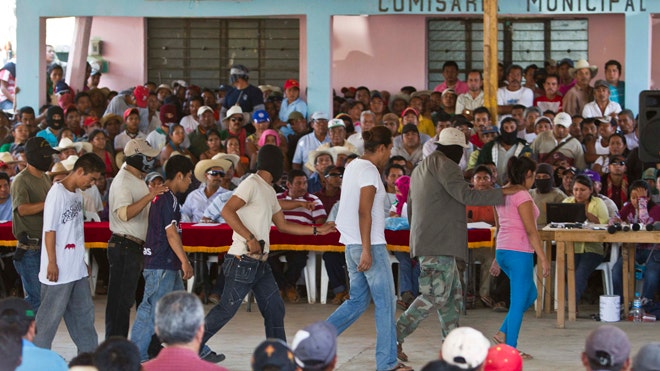Results 1 to 1 of 1
Thread Information
Users Browsing this Thread
There are currently 1 users browsing this thread. (0 members and 1 guests)
-
03-09-2013, 11:14 PM #1
Vigilante Justice? Mexico Detains Group Taking the Law Into Their Own Hands
Vigilante Justice? Mexico Detains Group Taking the Law Into Their Own Hands
Published March 08, 2013
Fox News Latino

FILE - In this Jan. 31, 2013 file photo, masked members of the community of Ayutla escort detained people to a community assembly in the town of El Meson, Mexico. Mexican farmers who took up arms against drug-gang violence and other crime in the mountains of southern Mexico have turned over to authorities 11 of 53 people that the vigilantes have put in improvised jails over the last month as suspected criminals. Bruno Placido, leader of the self-styled âself-defenseâ movement, described on Friday, Feb. 8, 2013 the 11 as the detainees accused by local residents of the most serious crimes, such as murder, kidnapping and extortion. He said they were turned over to state and federal officials. (AP Photo/Christian Palma, File) (AP2013)
MORELIA, Mexico – Authorities in Mexico detained 34 vigilantes who formed part of a "self-defense group" that allegedly kidnapped police officers and seized police equipment earlier this week in the western state of Michoacán.
The army raid in the town of Buenavista represents the strongest blow yet against the growing vigilante movement that has seen masked townspeople throw up checkpoints in several parts of southern and western Mexico.
The vigilante groups say they are fighting violence, kidnappings and extortion carried out by drug cartels, but concerns have surfaced that vigilantes may be violating the law, the human rights of people they detain, or even cooperating with criminals in some cases.
SUMMARY
In a meeting with the country's top human rights official, Raúl Plascencia, the leader of the Guerrero vigilante movement, Bruno Placido, said that "if the government starts investing in development, the (vigilante) movement will start demobilizing," according to a statement by Plascencia's National Human Rights Commission.
Sensitive over their lack of ability to enforce public safety in rural areas, official have, up to now, largely tolerated vigilante groups that have sprung up in Michoacán and neighboring Guerrero state.
But the Buenavista vigilantes apparently overstepped the bounds of that tolerance when they took over the town's police facilities, kidnapped officers and seized police weapons and vehicles earlier this week.
The army displayed for cameras the 34 detainees Thursday, and said that 29 assault rifles had been seized in the raid, along with 15 pistols. The army did not detail how many of those were police weapons.
The soldiers freed five municipal police officers and the police chief and recovered a half dozen vehicles the vigilantes had seized.
Some of the detainees wore printed T-shirts with the legend "Community Police," and some shouted to journalists, "We are community police!"
There is a semi-official, semi-recognized "community police" system in some parts of Mexico, where heavily Indian communities mete out forms of traditional justice, but the "self-defense groups" are not part of it.
The vigilantes seized local police officers after accusing them of supporting one of the drug cartels that have been engaging in turf battles in the area. The Michoacán-based Knights Templar cartel is fighting the Jalisco New Generation gang in the area.
However, charges of drug-cartel alliances have flown both ways.
The vigilantes in Buenavista and the nearby town of Tepalcatepec popped up in February with suspiciously sophisticated weapons, printed T-shirts and clothing that doesn't reflect the usual mix of participants. In other towns, vigilantes are mostly ragged farm workers with old, single-shot hunting rifles.
A professionally printed banner, of the kind often used by the Knights Templar, was hung by a roadside last week accusing the Buenavista vigilantes of being criminals working for a drug gang.
There was no immediate information on whether the 34 detained vigilantes had been formally charged. They could face weapons possession, kidnapping and other charges.
The mayor of Buenavista, Luis Torres, told the Milenio television news channel that the vigilantes were "people who are from the town ... I respect them, I respect their ideas ... but not their way of acting." He said he hoped soldiers and federal forces would take over security in the town.
Questions have abounded about whether some of the self-defense groups are simply attempts by rural political groups to call attention to the poverty and lawlessness of their regions, in hopes of attracting more government funds.
In a meeting with the country's top human rights official, Raúl Plascencia, the leader of the Guerrero vigilante movement, Bruno Placido, said that "if the government starts investing in development, the (vigilante) movement will start demobilizing," according to a statement by Plascencia's National Human Rights Commission.
Plascencia, who has expressed reservations about the vigilante movement in the past, turned his fire on authorities Thursday, saying that "there is no justification for the government to neglect its duty to ensure public safety."
Read more: Vigilante Justice? Mexico Detains Group Taking the Law Into Their Own Hands | Fox News Latino


 LinkBack URL
LinkBack URL About LinkBacks
About LinkBacks




 Reply With Quote
Reply With Quote


Twitter just suspended Ad account on X
04-19-2024, 05:54 PM in illegal immigration Announcements